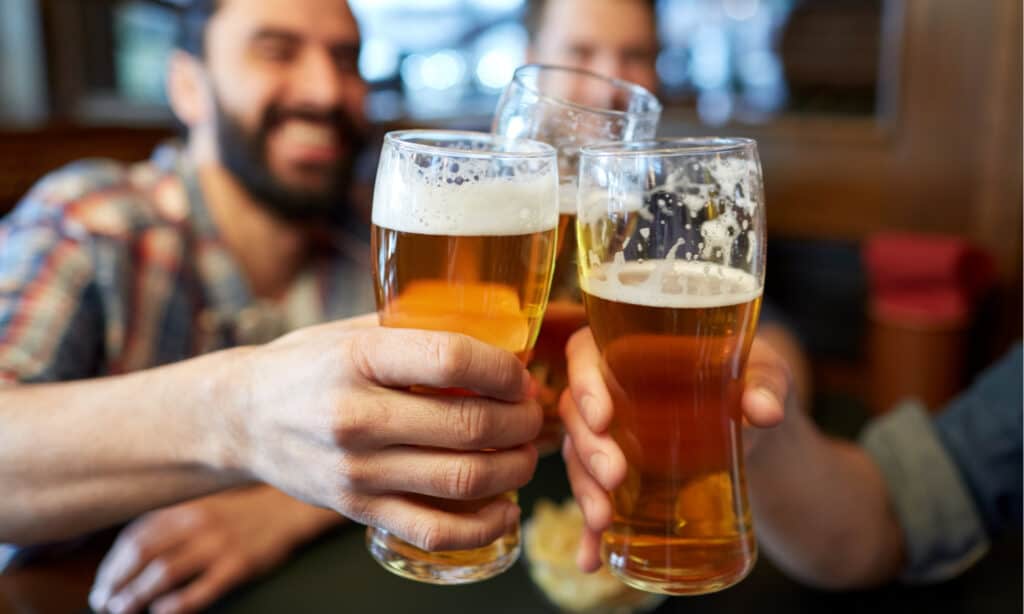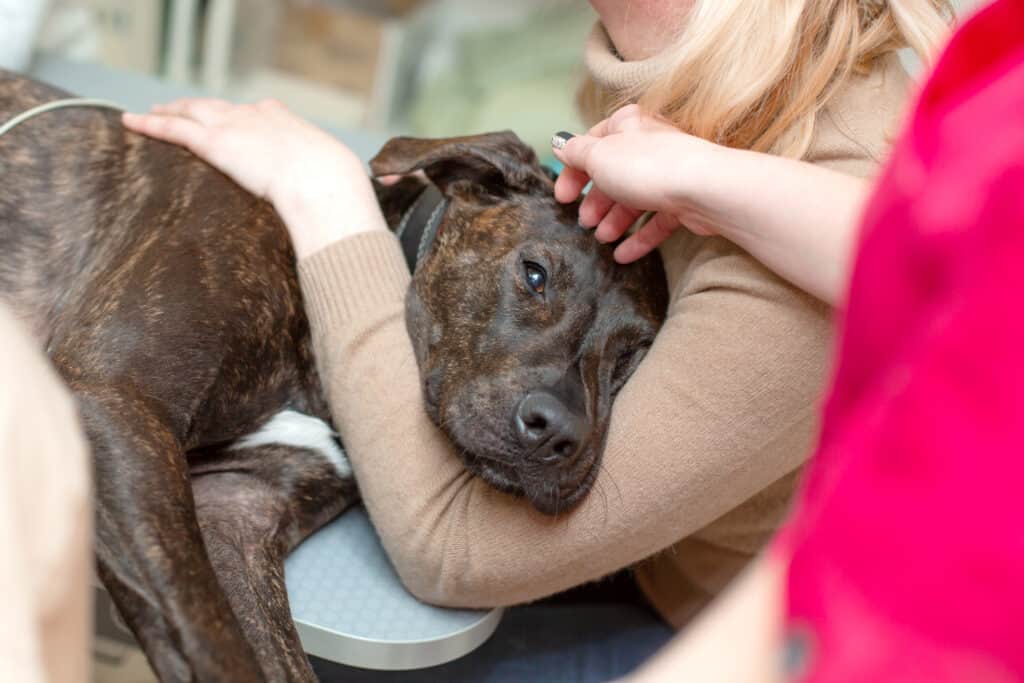The simple answer is yes, dogs can get drunk when given alcohol. And just like with humans, you will notice your dog will exhibit behavioral changes after consuming it. However, it’s important to know how alcohol can affect dogs and why you should make sure that your dog doesn’t have access to it. Read on to learn more about the impact alcohol can have on dogs.
How Does Alcohol Affect Dogs?

You should never give your dog any form of alcohol. It has no benefits and can cause serious, even life-threatening effects.
©Syda Productions/Shutterstock.com
Dogs can experience alcohol toxicity if they consume alcohol. It’s important to note that dogs are not naturally drawn to alcoholic beverages, so if you leave some out, it is not likely that your dog will attempt to consume them. However, accidents do happen and you may find that your dog has knocked some over or decided to have a taste.
What matters when it comes to alcohol toxicity in dogs is more than just the type of alcohol that was consumed, but also the amount of it. This is because different types of alcohol can contain varying amounts of alcohol. Craft beers, hard liquor, and wine all contain higher amounts of alcohol than lite beer.
Therefore, it’s important to know if the amount of alcohol your dog consumed is considerably dangerous. The amount of alcohol that becomes dangerous to your dog depends on a number of things like your dog’s health and weight. Smaller dog breeds are affected by alcohol much easier and at smaller amounts than larger dog breeds, but all dogs are negatively impacted by alcohol. Let’s take a look at how a dog’s body responds to alcohol.
Impairment to Central Nervous System
Alcohol impacts dogs in similar ways as it does humans. One of the similarities that alcohol has is its impact on the nervous system. Alcohol slows down a dog’s nervous system and causes your dog to lack coordination and experience lethargy. It only takes a small amount of alcohol for a dog to experience these impairments—especially if it is a smaller dog breed.
If you notice that your dog is stumbling around or doesn’t have good balance, it is a sign that its nervous system has been impaired.
Hypoglycemia
Hypoglycemia is a low blood sugar disorder. If your dog consumes alcohol it can cause a drop in its blood sugar levels to occur and result in lethargy, muscle weakness, and even seizures in some cases. If your dog has consumed alcohol, you should give your dog fresh water to drink and a few treats at a time to help keep its blood sugar stable.
Metabolic Acidosis
In some cases, the consumption of alcohol can lead to a condition called metabolic acidosis. This means that your dog experiences a rapid rise in its acidity levels that can cause various adverse side effects. Some of those include depression, reduced respiratory rate, very low heart rate, hypothermia, low blood pressure, and heart attacks.
Gastrointestinal Distress
Your dog can also experience gastrointestinal distress after consuming alcohol. Alcohol can irritate the sensitive lining of your dog’s gastrointestinal tract. This can result in your dog developing an upset stomach or other digestive issues, such as vomiting or diarrhea.
What Are the Symptoms of Alcohol Toxicity in Dogs?
When a dog has consumed alcohol, the effects are similar to that of a human under the influence. The effects are usually mild, but you should get in contact with your vet or an emergency animal clinic if you are concerned that your dog has consumed alcohol and is displaying symptoms of alcohol toxicity.
There are a few symptoms you should be on the lookout for if you suspect that your dog has consumed alcohol. Let’s take a look at them below:
- Vomiting
- Weakness
- Loss of coordination
- Depression
- Lethargy
- Drooling
- Collapse
- Hypothermia (low body temperature)
- Hypotension (low blood pressure)
- Hypoglycemia (low blood sugar)
- Decreased breathing rate
If you notice any of these symptoms in your dog you should get them to the vet or animal clinic as quickly as possible for treatment. Dogs that have consumed alcohol usually display mild symptoms, however, depending on the size and overall health of your dog, the symptoms may be more severe.
How to Prevent Alcohol Toxicity in Dogs
The first and most obvious way to prevent alcohol toxicity in dogs is to avoid giving your dog alcoholic beverages. You should never give your dog alcoholic drinks or alcohol-infused treats.
You can also be sure to keep alcoholic drinks out of reach of your dog and never leave drinks unattended. If your dog happens to knock over a glass containing alcohol, be sure to clean the spill immediately so that your dog doesn’t drink it.
What Should I Do if My Dog Drinks Alcohol?

If your dog demonstrates coordination issues or has trouble walking and has an increased heart rate, rush it to an emergency animal clinic.
©Try_my_best/Shutterstock.com
The best thing to do is to try to prevent your dog from having access to alcohol, but if you find that your dog has consumed it, there are a few things you can do. First, you should remove the source of the alcohol. If there was a spill, clean up all of the alcohol so that your dog doesn’t have access to more of it.
Next, try to determine how much alcohol your dog has consumed and if you notice any of the behavioral changes mentioned earlier, you should get in contact with your dog’s vet as soon as possible. You should also give your dog fresh water to drink. When your dog consumes alcohol, it runs the risk of having a low body temperature, so try to make sure that you keep your dog warm, but not too hot.
Alcohol can also cause low blood sugar in dogs so you can try giving your dog a few treats at a time, to keep its blood sugar at a safe level. If your dog is having coordination issues or trouble walking and an increased heart rate, you should get it to an emergency animal clinic as quickly as possible.
Once your dog is seen by a vet they may give your dog an injection that will induce vomiting so that your dog can empty the alcohol contents from its stomach. This type of procedure only works if administered within 20-40 minutes of your dog consuming the alcohol. This is because the alcohol must still be in its stomach in order for the induced vomiting to help.
Treatment options can also include the vet giving your dog intravenous fluids to help remove the alcohol from your dog’s system, as well as keep your dog’s blood sugar elevated and prevent harmful side effects like seizures.
Up Next
- Can Dogs Get Allergies?
- Can Dogs Spread Omicron?
- Can Dogs Get Skin Cancer?
- Can Dogs Drink Orange Juice Safely?
The photo featured at the top of this post is © Claire Lucia/Shutterstock.com
Ready to discover the top 10 cutest dog breeds in the entire world?
How about the fastest dogs, the largest dogs and those that are -- quite frankly -- just the kindest dogs on the planet? Each day, AZ Animals sends out lists just like this to our thousands of email subscribers. And the best part? It's FREE. Join today by entering your email below.
Sources
- American Kennel Club, Available here: https://www.akc.org/expert-advice/vets-corner/is-alcohol-dangerous-for-dogs/
- Masterclass, Available here: https://www.masterclass.com/articles/can-dogs-drink-alcohol
Thank you for reading! Have some feedback for us? Contact the AZ Animals editorial team.






